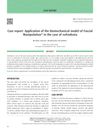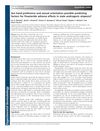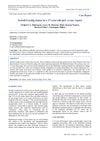 December 2023 in “Frontiers in endocrinology”
December 2023 in “Frontiers in endocrinology” Excess androgens may cause PCOS, not just be a symptom.
 8 citations,
December 2022 in “Nature Reviews Endocrinology”
8 citations,
December 2022 in “Nature Reviews Endocrinology” Sex hormones' effects on COVID-19 are unclear and more research is needed to understand their potential as treatment.
 16 citations,
July 2012 in “Current pharmaceutical biotechnology”
16 citations,
July 2012 in “Current pharmaceutical biotechnology” New treatments for skin conditions related to the sebaceous gland are being developed based on current research.
 4 citations,
July 2022 in “Medicina-lithuania”
4 citations,
July 2022 in “Medicina-lithuania” Women with Polycystic Ovary Syndrome (PCOS) often have higher levels of anxiety and depression, especially if they live in rural areas, have less education, don't have children, are over 30, or are obese.
 85 citations,
August 2018 in “Psychological Medicine”
85 citations,
August 2018 in “Psychological Medicine” Women with PCOS are more likely to suffer from depression, anxiety, and stress.
 August 2021 in “Pelviperineology”
August 2021 in “Pelviperineology” Fascial Manipulation treatment helped a woman with vulvodynia and other health issues.
 21 citations,
November 2014 in “Journal of Endocrinological Investigation”
21 citations,
November 2014 in “Journal of Endocrinological Investigation” Cross-sex hormone therapy is important for managing gender dysphoria and requires careful monitoring and healthcare provider education.
 157 citations,
May 2021 in “Endocrine Reviews”
157 citations,
May 2021 in “Endocrine Reviews” Early diagnosis and individualized treatment improve outcomes for Congenital Adrenal Hyperplasia.
 47 citations,
May 2020 in “Cardiovascular Research”
47 citations,
May 2020 in “Cardiovascular Research” The document concludes that future heart disease research should account for sex-specific differences to improve diagnosis, treatment, and outcomes.
 September 2023 in “Scientific reports”
September 2023 in “Scientific reports” Segmental hair analysis can track testosterone over time but needs adjustments for sex, hair color, and washing frequency.
 12 citations,
March 2016 in “Experimental Dermatology”
12 citations,
March 2016 in “Experimental Dermatology” Hand preference and sexual orientation may predict finasteride side effects in male hair loss.
21 citations,
January 2017 in “Dermatology Online Journal” Finasteride and dutasteride can cause sexual problems like impotence and low libido.
May 2019 in “Hair transplant forum international” Finasteride does not cause sexual dysfunction in men with hair loss.
 13 citations,
September 2018 in “Dermatologic Therapy”
13 citations,
September 2018 in “Dermatologic Therapy” Finasteride effectively stops hair loss in most patients, but concerns about rare sexual side effects exist.
 April 2024 in “International journal of reproduction, contraception, obstetrics and gynecology”
April 2024 in “International journal of reproduction, contraception, obstetrics and gynecology” A 17-year-old girl was diagnosed with a rare ovarian tumor, emphasizing the need for fertility preservation and psychosocial care.
 8 citations,
July 2018 in “Current Sexual Health Reports”
8 citations,
July 2018 in “Current Sexual Health Reports” Finasteride can cause lasting sexual dysfunction, depression, and other side effects, needing more research for treatment.
110 citations,
January 1984 in “Progress in brain research” Gonadal hormones may influence sex differences in play fighting in animals, but their effect on human spatial behavior is unclear and needs more research.
21 citations,
March 2018 in “JEADV. Journal of the European Academy of Dermatology and Venereology/Journal of the European Academy of Dermatology and Venereology” 5-alpha-reductase inhibitors may help stabilize or slow down hair loss in some frontal fibrosing alopecia patients, but more research is needed to confirm their effectiveness and safety.
 57 citations,
July 2016 in “The Journal of Sexual Medicine”
57 citations,
July 2016 in “The Journal of Sexual Medicine” 5α-reductase inhibitors increase the risk of sexual dysfunction, especially in men with enlarged prostate.
 72 citations,
April 2008 in “The Journal of urology/The journal of urology”
72 citations,
April 2008 in “The Journal of urology/The journal of urology” Dutasteride and finasteride do not significantly affect bone density, blood fats, or blood production, but slightly lower PSA levels and minimally impact sexual function in healthy young men.
 June 2017 in “The Journal of Clinical Endocrinology and Metabolism”
June 2017 in “The Journal of Clinical Endocrinology and Metabolism” Finasteride's sexual side effects not caused by androgen deficiency or SRD5A inhibition.
 1 citations,
June 2017 in “The Journal of Clinical Endocrinology and Metabolism”
1 citations,
June 2017 in “The Journal of Clinical Endocrinology and Metabolism” Finasteride use may cause sexual dysfunction; more research needed.
 May 2017 in “Journal of The American Academy of Dermatology”
May 2017 in “Journal of The American Academy of Dermatology” Finasteride and dutasteride increase sexual dysfunction reports.
 1 citations,
June 2023 in “Psychoneuroendocrinology”
1 citations,
June 2023 in “Psychoneuroendocrinology” Childhood sexual trauma, especially between ages 5-7, is linked to lower cortisol levels in adult hair, suggesting long-term stress response changes.
 12 citations,
December 2005 in “PubMed”
12 citations,
December 2005 in “PubMed” Some men with early hair loss may have similar hormonal changes to women with Polycystic ovary syndrome, and could be at risk for developing type 2 diabetes.
 35 citations,
February 2012 in “Journal of The American Academy of Dermatology”
35 citations,
February 2012 in “Journal of The American Academy of Dermatology” Finasteride significantly improves hair growth but may cause sexual side effects.
2 citations,
January 2000 in “Pediatrics in review” Early sexual development in children, especially girls, can be treated with hormone therapy to improve adult height and requires support for the child and family.
 7 citations,
June 2020 in “Translational Andrology and Urology”
7 citations,
June 2020 in “Translational Andrology and Urology” Finasteride for hair loss may cause lasting sexual, genitourinary, mental, and anti-androgenic side effects in young men.
 November 2023 in “Frontiers in Neuroendocrinology”
November 2023 in “Frontiers in Neuroendocrinology” Some people experience lasting sexual, psychological, and sleep problems after using finasteride or SSRI antidepressants, possibly due to similar underlying causes.
March 2020 in “European Journal of Pediatric Dermatology” Isotretinoin can cause gynecomastia by lowering testosterone levels.
























